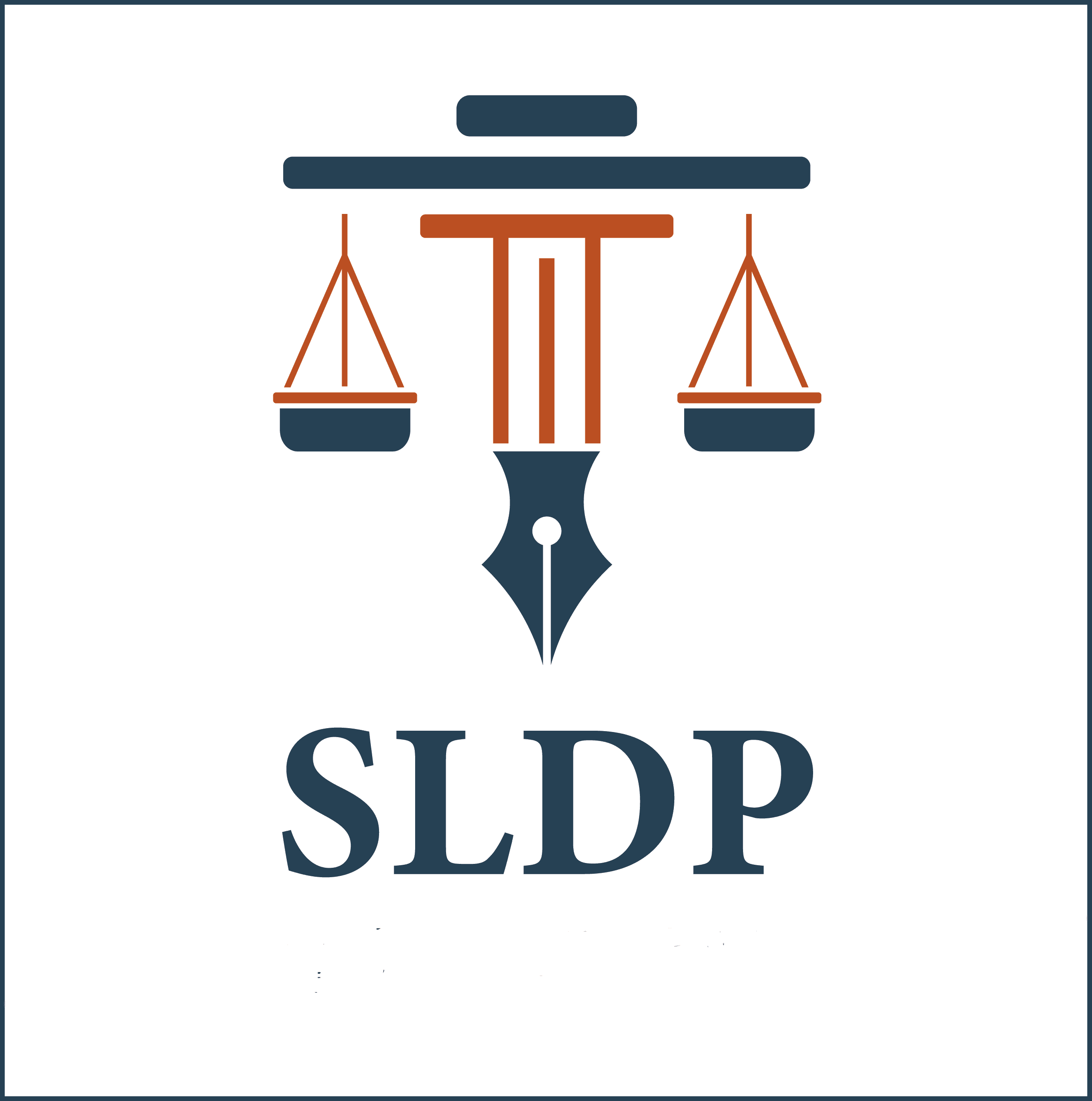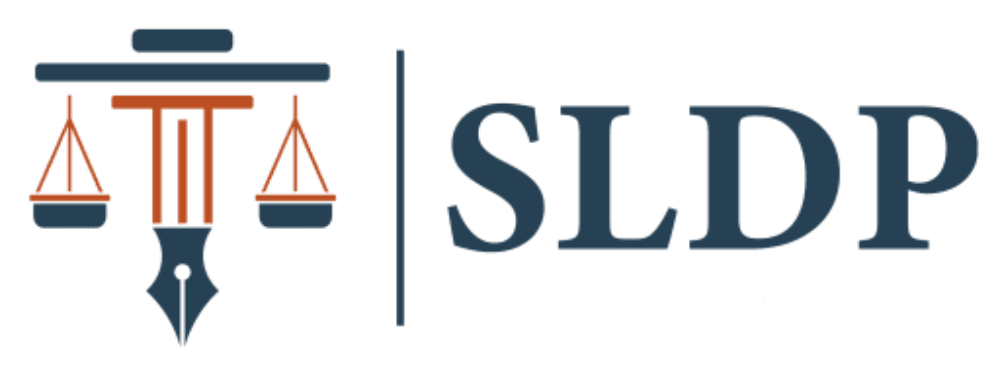August 6, 2025 | This post is also available in: Arabic

The story of the Syrian Legal Development Programme (SLDP) is a reflection of the upheavals and transformations of the Syrian revolution. It is not merely the story of a human rights organization, but a chronicle of sustained struggle—one that brings together legal innovation, deep faith in justice, and the ability to adapt to a complex and ever-changing reality.
Foundation in Exile: Revolutionary Seeds in an International Legal Landscape
At the revolution’s outset in 2011, many Syrians in exile believed in their people’s cause and shared hopes for freedom and dignity. SLDP’s founders engaged in UK protests and began leveraging their expertise in international law and human rights to build effective legal tools and institutions.
The Law in Action (2013–2015): Obligations in a Time of Arms
As armed opposition forces expanded their control on the ground, SLDP began in 2013 to deliver training on international humanitarian law and international human rights law to non-state armed actors assuming public functions in areas outside the regime’s control. In 2014, in partnership with other organizations, SLDP launched a project focused on fair trial guarantees in these areas, aiming to develop a judicial model that upheld human rights despite the fragile security and political context.
The Transformation Phase (2016–2019): Prioritisation and Civil Institution Building
As civil society emerged as a more prominent actor, SLDP recalibrated its priorities. Through the International Law Support Unit, the ad-hoc legal support focused on supporting Syrian civil society organizations through advanced training in international human rights law, international humanitarian law and international criminal law (including,documentation of violations, and evidentiary standards). The objective was no longer only accountability, but also building civil institutions capable of advancing human rights and fundamental freedoms—even in the absence of a political breakthrough.
In 2019, SLDP launched its Business and Human Rights Unit—an innovative step within the Syrian context. This unit was a response to growing concerns about the role of private companies—Syrian and international—in financing conflict actors or exploiting instability for economic gain at the expense of fundamental rights.
This initiative marked a new direction for SLDP, integrating economic justice into the broader pursuit of transitional justice in Syria. It was one of the first Syrian rights initiatives to address the intersection between economics and human rights through a structured, institutional approach.
The Consolidation Phase (2020–2023): Protracted Impunity and Strategic Adaptation
As the Syrian conflict evolved into a protracted regional crisis and persisting impunity environment, SLDP, through its International Law Support Unit, expanded its ad-hoc legal support to emerging associations of victims, survivors and families of victims, with the aim to empower and accompany such groups in advocating for their rights to truth, justice and remedy.
In the same period, SLDP entered a phase of internal development—strengthening its institutional structure, updating internal policies and procedures. In 2021, SLDP underwent a leadership transition: founding Executive Director Ibrahim Olabi stepped down, and Sana Kikhia assumed the role, leading a phase of long-term strategic planning, supported by a Board of Directors that included Olabi and co-founder Zahra Al-Barazi.
The Historic Turning Point (2024–2025): The Fall of the Regime and the Beginning of Reconstruction
December 2024 marked a historic turning point with the fall of the Assad regime—a development that reshaped the civil and political landscape. Members of SLDP’s Board of Directors transitioned into advisory legal roles within the Ministry of Foreign Affairs under the Transitional Government and formally resigned from the Board and all other roles and responsibilities at SLDP, in alignment with our conflict of interest policy and to uphold the organization’s independence and integrity. SLDP entered a new phase, preserving its founding principles, independence, and alignment with international law standards and human rights guarantees.
This phase focuses on supporting state-building and transformation efforts grounded in the rule of law and accountability, with a renewed emphasis on transitional justice, guarantees of non-recurrence and democratic transformation, addressing economic crimes, and advancing corporate human rights due diligence. The organization is now guided by a new Board of Directors, including lawyer Ilham Saudi, lawyer Nadim Houry, and Dr. Mohammad Katoub.
Accordingly, the organization launched a new vision under the name “SLDP Free”—a phase that builds on over a decade of experience, but introduces fresh tactics aligned with the challenges and opportunities of a post-Assad Syria. It benefits from a more open civic and human rights space and from Syria’s renewed momentum for justice, accountability, and the chance to rebuild institutions in a way that ensures the rule of law, non-recurrence, and the protection of human rights and fundamental freedoms.
From revolution, to war, to the fall of the Assad regime, SLDP stands as a clear example of Syrian civil society’s resilience and capacity for legal and rights-based resistance, even under the harshest conditions. Today, SLDP faces a historic responsibility: to translate its long-standing struggle into accountable and rights-affirming institutions that advance accountability and rule of law, ensure guarantees of non-recurrence and democratic transformation, and restore Syrians’ trust in law, good governance and justice.
“The journey of the Syrian Legal Development Programme is living proof of our collective belief that the law can be a tool of both resistance and reconstruction. From the time of defiance to this new era of rebuilding, we move forward with a renewed vision and a unique and dedicated team that is deeply attuned to justice and human rights. Not only our mission of building a Syria based on rule of law and human rights hasn’t changed; instead, it has finally been enhanced by the ability to bring our legal expertise and strategic approach in Syria, with Syria, and for all Syrians’’ — Sana Kikhia, Executive Director of the Syrian Legal Development Programme

